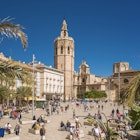
Nov 6, 2024 • 7 min read

Museo de las Ciencias Príncipe Felipe in Valencia, Spain, successfully combines learning with fun © Penny Kidd / Lonely Planet
One of the joys of Valencia is that it flies a little under the radar compared to Barcelona, Madrid or Seville, so the city’s museums are not its big-ticket sights. As you start exploring around town though, you will realize there is a high-quality, intriguing and varied selection of excellent art and museums devoted to particular aspects of local history and culture. They are the best way to really get to know the city and put what you are experiencing out on the street in context.
A tour of Valencia’s museums is also a dive into the city’s architecture, with exhibitions in everything from noble Renaissance palaces to Civil War refuges to the futuristic visions of renowned architect and Valencia native Santiago Calatrava.
Best for contemporary art
On the northwestern edge of the old town, IVAM is Valencia’s principal modern art gallery. The Institut Valencià d’Art Modern – its full name – is a striking space that has excellent temporary exhibitions. But it is also worth visiting for its permanent collection of the work of Catalan sculptor Julio González (1876-1942). Housing his work was a primary consideration in the creation of this gallery, and the sculptures are exquisitely lit and displayed. Classical nudes and busts in a variety of materials are impressive, but it is the series of sensitive iron Masques that really take the breath away and set the scene for better-known artists later in the 20th century. The café here is also a top place to hang out on the edge of the Barrio del Carmen.

Best for delving into ruins
Like many Mediterranean cities, the archaeological history of Valencia is a complex one. Close by Valencia’s cathedral, you can get a fascinating glimpse of that complexity at L’Almoina, where in an atmospheric basement space you can stroll around a range of ancient foundations. Excavations have revealed rich layers, with a Roman bathhouse, forum buildings and a factory, the remains of the later Moorish fortress, a royal cemetery and a Renaissance hospital for poor people.
Best classical gallery
Though it feels a little understated, Valencia’s Museo de Bellas Artes, housed in a former seminary, is one of Spain’s best traditional art galleries. Bright and roomy, it houses works by significant Spanish masters, including some fine Goya portraits, a haunting Velázquez and works by El Greco, Murillo and local painters. A dedicated wing is devoted to Joaquín Sorolla, a versatile Valencian artist (1863-1923) who at his best was capable of capturing the spirit of his era in Spain via his sensitive portraiture. Look out for María convaleciente, a breathtaking depiction of his ill daughter.

Best architectural extravaganza
The exuberance of the façade of this flamboyant palace – curling and swirling as if in motion – is reason enough to tempt you inside. The rococo extravagance continues in the gloriously over the top interiors, which house a museum dedicated to the traditionally important local ceramics industry. It’s a good mixture of granular information and handsome displays, with historic and modern works cleverly juxtaposed.
Most elegant
The elegance of this 15th century palace in a slightly off-the-beaten-path corner of Valencia’s old town makes it a fitting setting for a museum of silk. This was a major Valencian industry and this building was once its guildhall. The displays take you through the process from munching caterpillars to swishing velvet-sleeved courtiers, but the amount of information is just right and easily digested. The interiors themselves are beautiful, particularly a stunning rococo tiled floor depicting the global reach of the silk trade.

Best for local culture
If you can’t be in Valencia for Las Fallas, the city’s premier festival, you can get a taste of it at the Museo Fallero. At each year’s festival, neighborhood groups produce hundreds of fallas, giant burlesque statues of papier maché and polystyrene, surrounded by capering figurines (ninots). The scenes are often references to topical happenings in politics or popular culture. All are destined to be burned in huge bonfires, except one figurine that is spared each year by popular vote. The lucky ninot ends up preserved for posterity at the museum. It is fascinating to see their evolution through the years and to see the comical, grotesque and sometimes moving likenesses up close.
Most unusual
Right in the heart of things on Calle de Caballeros, a key road in historic Valencia, is one of the city’s quirkier museums. That museum, L’Iber, is devoted to toy soldiers, with a collection that numbers over a million tiny combatants. Dioramas and set pieces of historic battles are astonishingly detailed, and you can admire infantry stretching from Ancient Greece to modern times and into the world of science fiction.
Best for children
The spine of Santiago Calatrava’s majestic assemblage of buildings at the City of Arts and Sciences is this brilliant science museum, housed within a structure that stretches out like a giant whale skeleton with protruding ribs and a knobbly spine. Inside it’s all interactive and really nails that difficult-to-achieve blend of learning while having a lot of fun. It’s great for all ages and covers everything from the solar system to the inner workings of the brain, and it has a lot of good content on sustainability.
You might also like:
5 spectacular road trips around Spain
Expats say these are the best cities to live and work in
This Spanish city is the first to measure tourism's carbon footprint

Art and Culture
Copy my trip: An unforgettable family trip to Spain with Elsewhere by Lonely PlanetNov 19, 2024 • 4 min read

Nov 6, 2024 • 7 min read

Oct 23, 2024 • 6 min read






